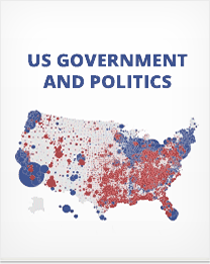Political Behavior, Political Parties, and Elections
This section covers the following topics
- The influence of public opinion on policymakers
- The process of political socialization and how this impacts voting behavior
- The development of political parties
- Campaign finance and strategy
- The election process, including primaries and caucuses
Section Summary
Measuring and keeping up with public opinion is important for both candidates and policymakers. Understanding political socialization, or the way that a person acquires his or her political views, is important for analyzing voting trends and political behavior. One of the key actors in political behavior is the political party, which gives voters an important link to candidates. The main job of a political party is to influence public policy through getting their candidates elected. Candidates depend on the political party for resources, although their individual campaign finance and strategy are important for the success of their campaign. The election process begins with primaries and caucuses during the nomination. After a party’s national conventions, the general election requires candidates to adjust their strategy.
Public Opinion
The Importance of Public Opinion
Policymakers need to know what public opinion is in order to do an effective job and get re-elected. The most common measure of public opinion is polling, but polls alone will not tell policymakers exactly what they need to do.
When looking at public opinion, policymakers need to know the intensity of people’s opinions. In other words, how passionately do voters feel about this issue? They also need to look out the level of stability that this opinion has. Public opinion on some issues may change dramatically and rapidly over time.
Polls
Polls must have several elements in order to be accurate gauges of public opinion.
-
A random sample where every person has an equal chance of being selected for the sample. With truly random samples, modern polls can...
Sign up to continue reading Political Behavior, Political Parties, and Elections >
